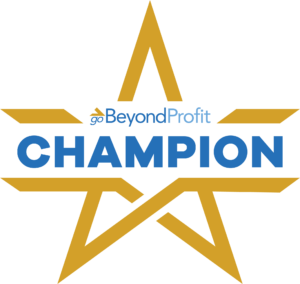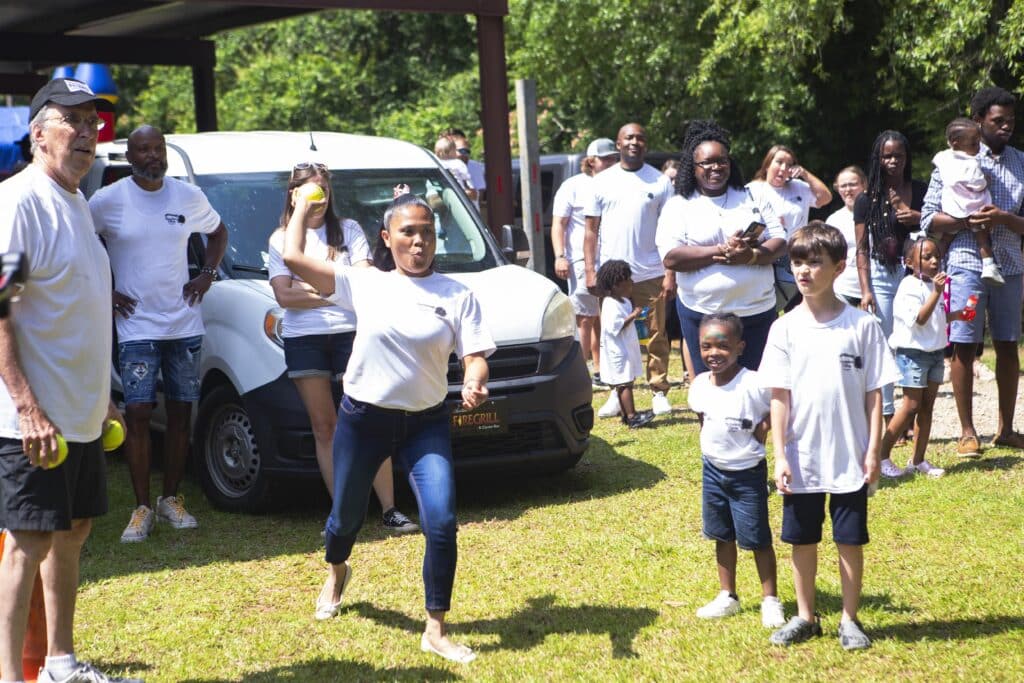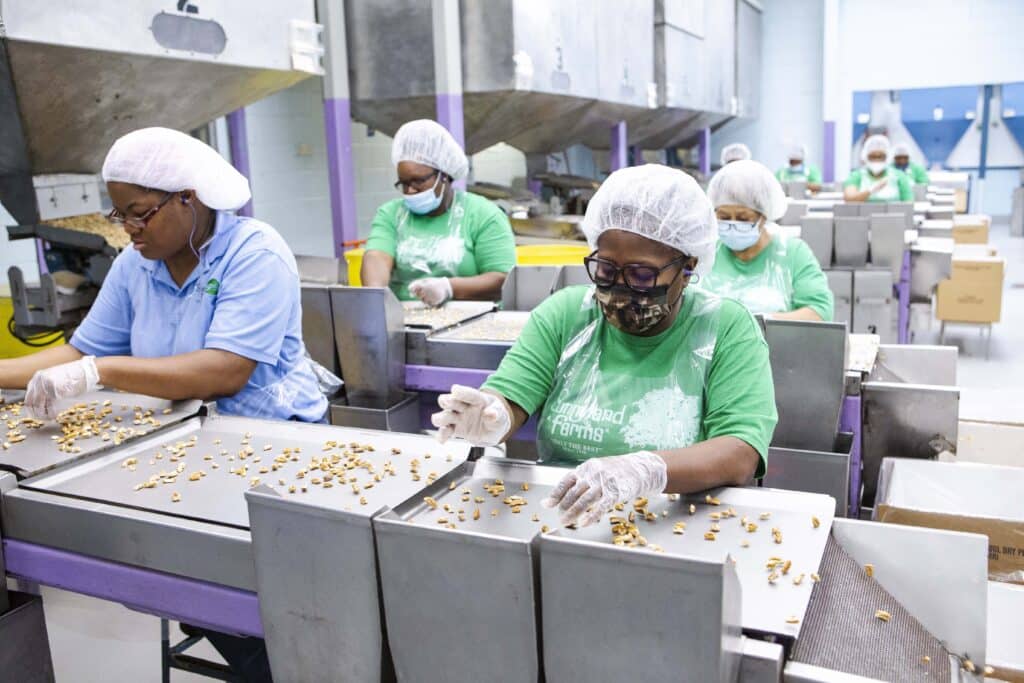Celebrating 75 Years of Generosity
This year marks the seventy-fifth anniversary of Sunnyland Farms, a 1,760-acre pecan farm and manufacturing company based in Albany, Georgia. CEO Alex Willson and his family have invested deeply in Southwest Georgia, providing quality jobs to generations of families as well as offering support to the local non-profits serving the needs of the community.
Instilling a people-first commitment into every aspect of company life proved to be the key ingredient for their business resilience over the years helping the company weather hurricanes that damaged thousands of acres of land and a recent kitchen fire that threatened to shut the company down during their busiest season.
Sunnyland Farms, and its CEO Alex Willson were nominated and selected by fellow Georgia business leaders as a goBeyondProfit Champion for their comprehensive, generational approach to generosity.

Decades Long Commitment to People
Sunnyland Farms has been an institution in Albany for 73 years of our 75 years. We started in Atlanta, and as the company grew, we focused not only on turning a profit, but providing more quality jobs and making sure we give back to the community in various ways. When my grandparents moved here, one of the number one things that they said they wanted to do was to give back to their community. They wanted to put down roots and they did that through the farm.
From the earliest days we have tried to play our small part in helping the greater community that is southwest Georgia. Where there’s a need, we try to help fill it.
Sunnyland’s commitment is to its people, 100%. Always has been, always will be. I think for any organization, employees are obviously the most critical thing you have. It’s your human capital. It is what allows you to do what you do. And I think most of our employees would say they have a vested interest in the company, because as a company, we try to make sure we have a vested interest in them – both here at work, but also outside of their job as well.
I think the biggest example of our passion towards community is displayed in our employee tenure. Most people at Sunnyland have worked here 15+ years. At our “Family Day” event we see people that have been at the company for 43 years and sometimes multiple generations of employees. It’s because we are so family-oriented and we believe in people, and we believe in promoting from within. That really started with my grandmother. She just was passionate about bringing people in and creating a family and a team that could work together for a lifetime.

To all our Sunnyland employees, I want to say thank you. We can’t do what we do without you guys. We have so many people who are experts in their fields, whether it’s cracking pecans, baking rum cakes, getting boxes out the door as fast and efficiently as possible. Thank you, guys, for everything you do. We couldn’t do this without you guys.
Generosity Endures When Tragedy Strikes
On Thanksgiving morning in 2022 I woke up to a text that said there’d been a fire in our kitchen. Our security guard was the only person on site and his calm demeanor made me think it was just a small fire, nothing big.
When I arrived and got to the kitchen, everything was completely covered in ash. It was soaking wet, where obviously the fire department has sprayed hundreds, if not thousands, of gallons of water on all of our equipment.
We had pre-staged cakes, three or four pallets of cakes that were ready to be packed and sent out the door on UPS trucks. Those were all covered in soot and destroyed. Our entire kitchen became non-functional for the rest of the fall. We had to scramble, which was really chaotic, especially during the busiest four weeks of our entire year.
It’s still so emotional thinking about the way people responded. We saw people spring into action. We saw teams organize themselves. People were pulling equipment out of the ashes just to see if we could save anything, stepping up to the plate and comforting us when we were trying to bring comfort to our employees. The Sunnyland team-oriented environment was on full display.

We were all devastated. We were all scared, but I’ve never been prouder of our company in that moment. It showed us what we were capable of, in a good way, and it was one of those times when tragedy brings a community together.
Flexibility in Leadership
I’m pretty flexible in my personal life, but when I come to work, I tend to have a very structured way I like to do things. For better or worse, between Hurricane Michael, then COVID, then a kitchen fire I’ve found that flexibility as a leader is critical. Things simply don’t always go as planned. You must pivot to plan B, or frankly often it’s plan C, or D, and be able to do that while also maintaining a calm demeanor.
People who report to you feed off of you. And one thing we talk about in our manager meetings constantly is that it’s okay to freak out when things are going bad. We’ve got a 1,700-acre pecan grove that, if you need to go freak out, take a little walk, freak out, then come back in, and it’s time to lead. When we’re inside the gate, people are feeding off your energy, and so you’ve got to go ahead, levelheaded, make a tough call, and don’t get bogged down with overanalyzing.
For better or worse, some of these crises have shaped my leadership style, but I think it’s helped me become more flexible and able to react quicker and better when certain situations present themselves.
Implementing the Request for Flexibility in Manufacturing
Workplace flexibility has been different for us because we have so many unique environments. We have an office where it is easier to be flexible, you have a laptop, you have internet and can work from anywhere.
But a large portion of what we do is manufacturing and if you need ten people to run a production line, you need all ten people to run a production line. If two of them have a kids’ play at 9:00 and one of them has kids play at 10:00, that makes scheduling very difficult.
We asked our managers for their input on how to solve the request for flexibility. We started by asking questions, trying to find out what people really want and need. Our work can be seasonal with a high concentration of time in the fall. We challenged ourselves to figure out how we can give our employees time back with their families during the rest of the year.

We started with the idea of summer hours. A lot of offices do summer hours, so we offered our teams the option of a 36-hour work week. But they didn’t like that solution because they know what it takes to get the job done and they were concerned about the impact on the production lines. So we all decided we would simply start by trying a modified 40-hour schedule working slightly longer for four days and getting off at noon on Fridays.
When that worked well, we brought the teams the idea of accomplishing the forty hours needed in four days versus five. We piloted the idea for a month and got their feedback. As a result, since 2022, everybody gets a three-day weekend every single week for about four to five months out of the year. It’s been hugely successful. Together we figured out a way for people to stretch their time. Now, they can go on long weekend vacations without having to burn PTO.
Is Generosity a Fad or Essential to Business?
It may be a fad, and it may be something that the millennials or Gen Z care about, and something that people are just checking a box. But it’s also probably the right thing to do.
For instance, we’re not trying to hook up our new kitchen with solar panels because I can put it on our marketing materials, but because it’s a little more sustainable for the environment. There’s already a lot of people in the world, and we’re just trying to do our little part and maybe leave it a little better than we found it.
I don’t really think it’s a fad. I feel like if you’re not being generous, it’s going to be tougher for you to get employees because I think employees aren’t solely interested in pay.
Everybody wants to make money, but everybody also wants to feel part of something. That’s the biggest issue that we’ve seen. If people don’t buy into what you’re doing, it doesn’t matter what you pay. They need to feel like they’re part of something.
I don’t think generosity is going to be a fad, I think it’s going to be here to stay.
